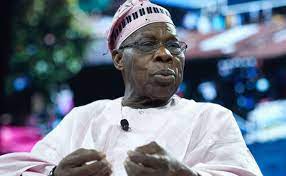Nigeria’s former President Olusegun Obasanjo on Wednesday said the nation’s current degenerating situation is “beyond party politics and requires all hands to be on deck”.
He said the country has lost direction in nation building, insisting that: “As long as we don’t get it right in nation building, we cannot get anything right in this country”.
Mr Obasanjo made the remarks as the special guest of honour at Babcock University’s 20th undergraduate and 11th postgraduate convocation lecture.
The guest lecturer, Kingsley Moghalu, a former deputy governor of the CBN, spoke on the theme; “Knowledge, Vision, Passion and Innovation in the Context of Nigeria’s Development.” The event was held at the university’s amphitheatre in Ilishan-Remo, Ogun State.

Mr Obasanjo noted that the situation in Nigeria has become so precarious that “no individual can say he or she has a solution to the problems.”
Moghalu harps on innovation
During his lecture, Mr Moghalu noted that the solution to Nigeria’s dire economic situation and foreign exchange crisis is to scale up innovation. He said such intervention can “break the Nigerian economy’s structural dependency as an import- and consumer-driven one.”
He said: “Innovation-driven economies remain competitive, adapting to the needs of the future, while natural resource-dependent economies such as ours risk being left behind by global and market trends and thus condemning our citizens to poverty.
“Nigeria has a national policy in science, technology, and innovation. The federal government has several technology and innovation-related agencies, but these public sector efforts have not yielded any innovation-driven impact on Nigeria’s economy.”
Mr Moghalu, who is now the President of the Institute for Governance and Economic Transformation (IGET), spoke on his presidential campaign in the 2019 election, and how he proposed the establishment of a N500 billion initial capital fund for innovation and start-up businesses, to be managed by the private sector.
“For an innovation-powered economy to rise in Nigeria, we must create a social consensus. Innovation and its practical applications in society must be popularised, and specific conscious awareness of it as a prime path to Nigeria’s development,” he added.
Knowledge society
Mr Moghalu also explained that “to secure our future as a country, Nigeria must increasingly become a knowledge society.”
The United Nations Educational, Scientific and Cultural Organisation (UNESCO) says that knowledge societies are those with the capability to identify, produce, process, transform, disseminate, and use the information to build and apply knowledge for human development.
Speaking further, Mr Moghalu said the wealthiest countries in the world such as Japan, Switzerland, and South Korea, have no natural resources but they have the knowledge to import Nigeria’s natural resources to produce sophisticated products.
He explained that the countries have built a knowledge economy, defined “as one in which intellectual property – knowledge and information systems that drive an ever-increasing pace of scientific and technological advances – is the basis of production and services.”
Mr Moghalu also suggested restructuring as a solution to Nigeria’s economic development because the institutional arrangement where the majority of states depend on the federal government for allocations from natural resource revenues to pay workers’ salaries and provide basic services has had profoundly negative implications for Nigeria’s economy.

